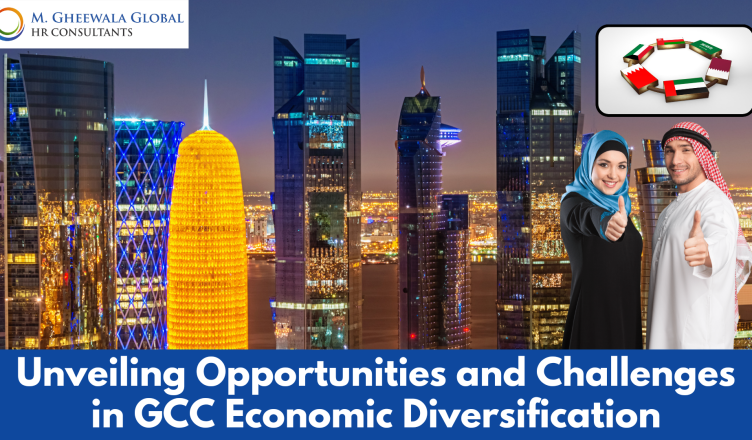The economies of the Gulf Cooperation Council (GCC) – Bahrain, Kuwait, Oman, Qatar, Saudi Arabia, and the United Arab Emirates (UAE) – have long been synonymous with oil. These vast reserves of black gold fueled rapid growth and prosperity. However, as the world transitions towards a more sustainable future, the need for economic diversification has become paramount. This blog explores the GCC’s efforts to diversify their economies, analyzes the opportunities and challenges they face, and highlights key initiatives driving this transformation.
Why Diversification Matters for the GCC
While oil has brought immense wealth to the GCC, relying on a single resource poses significant risks:
Price Volatility: The global oil market is susceptible to price fluctuations. A dip in oil prices can have a severe impact on GCC economies.
Dependence on External Factors: The GCC’s prosperity hinges on global demand for oil, leaving them vulnerable to external economic forces.
Limited Job Creation: The oil sector employs a relatively small portion of the workforce. Diversification is crucial for creating new employment opportunities, especially for a growing youth population.
According to the IMF (International Monetary Fund), economic diversification is essential for the GCC to ensure long-term sustainable growth and prosperity.
Unveiling the Opportunities: Diversification in Action
GCC countries are actively pursuing diversification strategies across various sectors:
Tourism and Hospitality: Capitalizing on stunning landscapes, rich cultural heritage, and world-class infrastructure, the GCC is developing itself as a tourist destination. This creates jobs, boosts infrastructure development, and attracts foreign investment.
Logistics and Transportation: The GCC’s strategic location makes it a natural transportation hub. Investments in ports, airports, and logistics infrastructure are positioning the region as a key player in global trade.
Renewable Energy: Recognizing the finite nature of oil and the growing importance of sustainability, GCC countries are investing heavily in renewable energy sources like solar and wind power. This not only reduces dependence on oil but also positions them as leaders in the clean energy transition.
Financial Services: The GCC aspires to become a global financial hub, attracting international financial institutions and fostering innovation in the fintech sector. This diversification creates high-skilled jobs and strengthens the financial muscle of the region.
Challenges on the Road to Diversification
While the opportunities are promising, the GCC faces significant challenges in its diversification journey:
Reliance on Oil Revenue: Oil still constitutes a major source of government revenue. This can create a disincentive for investing in diversification efforts.
Human Capital Development: The current workforce may not possess the skills needed for the new knowledge-based economy. Investing in education and training is crucial.
Bureaucracy and Regulatory Hurdles: Streamlining regulations and fostering a business-friendly environment is essential for attracting foreign investment and encouraging entrepreneurship.
Overcoming these challenges requires sustained commitment from governments, a collaborative approach involving the private sector, and a focus on developing a more skilled and adaptable workforce.
The GCC’s economic diversification journey is ongoing, presenting both exciting opportunities and formidable challenges. By embracing innovation, investing in human capital, and fostering a dynamic business environment, the GCC can successfully transition towards a more diversified and sustainable future. The region has the potential to become a global leader not just in oil production, but also in innovation, knowledge, and sustainable development.

